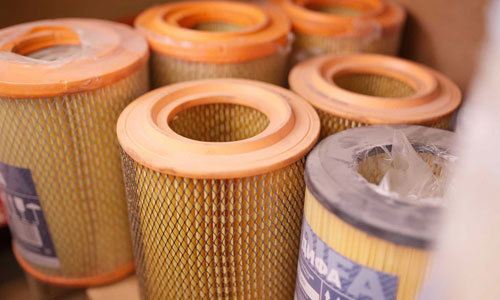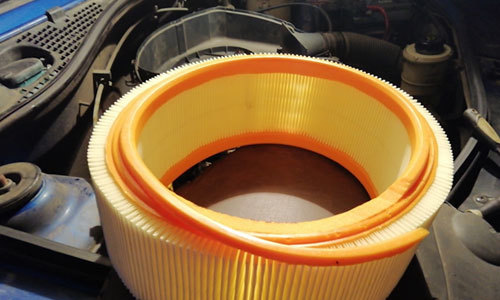Essential Guide to Hydraulic Oil Filters for Excavators
2025-07-22
Hydraulic oil filters are vital components in the hydraulic systems of excavators, designed to remove contaminants from the hydraulic fluid. This ensures the smooth operation of the system and protects the machinery’s components from damage. The hydraulic system relies heavily on clean oil to function effectively, as any impurities can lead to serious issues such as pump failure or reduced efficie
Hydraulic oil filters are vital components in the hydraulic systems of excavators, designed to remove contaminants from the hydraulic fluid. This ensures the smooth operation of the system and protects the machinery’s components from damage. The hydraulic system relies heavily on clean oil to function effectively, as any impurities can lead to serious issues such as pump failure or reduced efficiency.
Hydraulic oil filters serve several key functions. First and foremost, they filter out dirt, dust, and other particles that can accumulate in the hydraulic oil over time. These contaminants can cause wear and tear on critical components like pumps and valves, leading to costly repairs and extended downtime. By regularly replacing or maintaining hydraulic oil filters, operators can significantly extend the life of their excavators and maintain optimal performance.
Another important aspect of hydraulic oil filters is their ability to improve the overall efficiency of the hydraulic system. Clean oil allows for better fluid flow and pressure maintenance, which are crucial for the effective operation of excavators. When the oil is free from contaminants, the hydraulic system can respond more quickly and accurately to operator commands, enhancing productivity on the job site.
When selecting hydraulic oil filters for excavators, it is essential to consider the type of filter that best suits your machinery's needs. There are various designs, including spin-on filters, cartridge filters, and return line filters, each with its unique advantages. Spin-on filters are often easier to replace, while cartridge filters may provide higher filtration efficiency. Return line filters, on the other hand, clean the oil returning to the reservoir, ensuring the fluid remains clean and free of contaminants.
To maintain the performance of hydraulic oil filters, regular maintenance is crucial. This includes periodic inspection and replacement of filters according to the manufacturer's recommendations. Neglecting filter maintenance can lead to decreased hydraulic performance, increased wear on components, and ultimately, costly repairs.
In summary, hydraulic oil filters are indispensable for excavators, serving to protect the hydraulic system and improve efficiency. By ensuring that filters are maintained and replaced as needed, operators can enhance the longevity and reliability of their machinery. Proper attention to hydraulic oil filters not only saves money in the long run but also contributes to the overall effectiveness of excavation operations.
Hydraulic oil filters serve several key functions. First and foremost, they filter out dirt, dust, and other particles that can accumulate in the hydraulic oil over time. These contaminants can cause wear and tear on critical components like pumps and valves, leading to costly repairs and extended downtime. By regularly replacing or maintaining hydraulic oil filters, operators can significantly extend the life of their excavators and maintain optimal performance.
Another important aspect of hydraulic oil filters is their ability to improve the overall efficiency of the hydraulic system. Clean oil allows for better fluid flow and pressure maintenance, which are crucial for the effective operation of excavators. When the oil is free from contaminants, the hydraulic system can respond more quickly and accurately to operator commands, enhancing productivity on the job site.
When selecting hydraulic oil filters for excavators, it is essential to consider the type of filter that best suits your machinery's needs. There are various designs, including spin-on filters, cartridge filters, and return line filters, each with its unique advantages. Spin-on filters are often easier to replace, while cartridge filters may provide higher filtration efficiency. Return line filters, on the other hand, clean the oil returning to the reservoir, ensuring the fluid remains clean and free of contaminants.
To maintain the performance of hydraulic oil filters, regular maintenance is crucial. This includes periodic inspection and replacement of filters according to the manufacturer's recommendations. Neglecting filter maintenance can lead to decreased hydraulic performance, increased wear on components, and ultimately, costly repairs.
In summary, hydraulic oil filters are indispensable for excavators, serving to protect the hydraulic system and improve efficiency. By ensuring that filters are maintained and replaced as needed, operators can enhance the longevity and reliability of their machinery. Proper attention to hydraulic oil filters not only saves money in the long run but also contributes to the overall effectiveness of excavation operations.
Key words:
Related News
How often does the air filter change?
The air filter element is mainly used to block impurities such as dust and sand in the air.
2024-05-22
What are the car filters? When do car filters need maintenance?
As an oil filter, it is generally replaced together with the oil during maintenance.
2024-05-22
The choice of filter manufacturers should be considered comprehensively
Before choosing a filter manufacturer, you must understand the relevant background of the manufacturer.
2024-05-22








